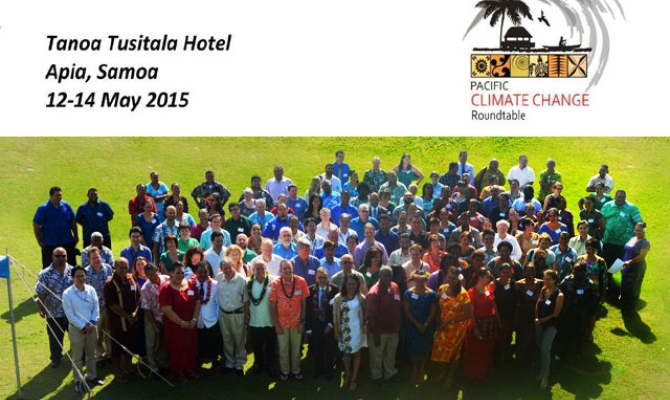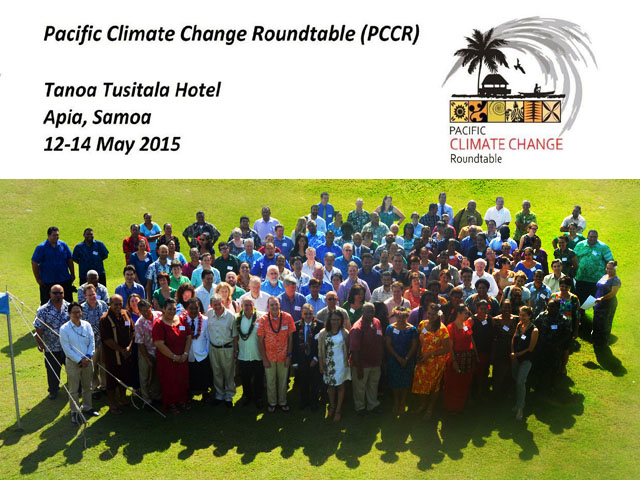
Climate Change Resilience
15 May 2015, Apia, Samoa, PCCR - As the curtain falls on yet another biennial conference on climate change for Pacific Island officials and their donor partners in Apia, lead organisers have labelled it the best conference to date.
"This has been the Fifth Pacific Climate Change Roundtable (PCCR) in this format and - in my view - it has been the best," David Sheppard, Director-General of the Secretariat of the Pacific Regional Environment Programme (SPREP) told the more than 200 delegates who attended the PCCR at the Tanoa Tusitala Hotel's conference centre.
"It is interesting to note the evolution of the PCCR. At our first and second PCCR's in this format, in 2008 and 2009, we were torn between whether the Roundtable was a policy, decision making forum or an information sharing, networking forum.
"We took the decision that the PCCR should be the latter – a key forum for discussion and for sharing information and experience. As I said on Tuesday, it provides the chance to take a deep breath, to share experience and assess progress on climate change in our region."

Part of the success Mr Sheppard believes has been the desire by the organisers and delegates to keep the Pacific – the islands and its peoples – the main focus of the roundtable.
"The fourth PCCR in Nadi in 2013 made a clear decision that this PCCR should focus on Pacific island countries and that presentations should put Pacific countries "front and centre" at the PCCR and that we focus on the needs and priorities of Pacific countries and peoples.
"I believe this Roundtable has achieved this objective and that we have – in the words of one of the delegates from Tonga – been listening to our communities."
This week's 4-day meeting in Samoa comes at a crucial time as member countries of the United Nations scramble to finalise a new deal on climate change. The final round of negotiations is set for Paris in December.
Mr Sheppard reminded roundtable delegates, many of whom will be in Paris as negotiators for their governments, of key issues to consider in any climate change initiative.
"We have heard about our Strategy for Resilient Development, our approach to integrate climate change and disaster risk reduction in our region. We have noted this is a world first and seen as a globally leading example to other communities and regions around the world.
"We have addressed and agreed on the need for long term and sustainable finance for climate change in our region. In particular, we need to improve access by Pacific countries to climate finance, and the need to use opportunities such as the Green Climate Fund to strengthen national capacities to access climate finance.
"We have noted that our region contributes 0.03% of the world's greenhouse gas but is in the front line of a changing climate. We have had a wealth of practical, exciting and groundbreaking experiences presented this week. The case studies and presentations show how much exciting work and innovation is underway in our region.
"In the words of President Loewk of the Republic of the Marshall Islands: "we are not just standing on the shore waving our hands.
"However all this work and activity will be of limited value if we cannot agree on a Legally Binding Agreement at COP 21 in Paris later this year. We have heard strongly and clearly from Ambassador Sareer (Chair of Alliance of Small Island States) that we must conclude the strongest legally binding agreement to limit greenhouse gas emissions at COP 21."
Host of COP 21, France was represented at the PCCR by His Excellency Jean-Luc Faure-Tournaire, the Deputy Permanent Representative of France to the Pacific Community who in his parting message to delegates assured that the concerns of the Pacific would be heard at the Paris negotiations in December.
He said this was the same assurance the French President Francois Hollande made when he met Pacific leaders in New Caledonia late last year.
"France would also like to see a legally binding agreement, a balanced one that takes into account adaptation and mitigation measures on climate change as well as loss and damage and the move towards a low carbon society, we are all in the same boat," said His Excellency Faure-Tournaire.
The Pacific Climate Change Roundtable was held from 12 – 14 May in Apia, Samoa. The event in its current format has been held since 2008 on a biannual basis coordinated by SPREP in partnership with others and is coordinated by SPREP with the guidance from a steering committee.
The PCCR has been made possible with support from the Government of Switzerland, Government of Samoa, Government of Australia, European Union, GIZ, United Nations Development Program (UNDP), Secretariat of the Pacific Community (SPC), Pacific Islands Forum Secretariat (PIFS), University of the South Pacific (USP) and the Pacific Council of Churches (PCC). Additional funding support was provided by the EU-GIZ Adapting to Climate Change and Sustainable Energy (ACSE) Programme, and Climate Analytics through its High Level Support Mechanism (HLSM) project as well as the United States Agency for International Development (USAID).- Samisoni Pareti/SPREP/#pccr2015
"This has been the Fifth Pacific Climate Change Roundtable (PCCR) in this format and - in my view - it has been the best," David Sheppard, Director-General of the Secretariat of the Pacific Regional Environment Programme (SPREP) told the more than 200 delegates who attended the PCCR at the Tanoa Tusitala Hotel's conference centre.
"It is interesting to note the evolution of the PCCR. At our first and second PCCR's in this format, in 2008 and 2009, we were torn between whether the Roundtable was a policy, decision making forum or an information sharing, networking forum.
"We took the decision that the PCCR should be the latter – a key forum for discussion and for sharing information and experience. As I said on Tuesday, it provides the chance to take a deep breath, to share experience and assess progress on climate change in our region."

Part of the success Mr Sheppard believes has been the desire by the organisers and delegates to keep the Pacific – the islands and its peoples – the main focus of the roundtable.
"The fourth PCCR in Nadi in 2013 made a clear decision that this PCCR should focus on Pacific island countries and that presentations should put Pacific countries "front and centre" at the PCCR and that we focus on the needs and priorities of Pacific countries and peoples.
"I believe this Roundtable has achieved this objective and that we have – in the words of one of the delegates from Tonga – been listening to our communities."
This week's 4-day meeting in Samoa comes at a crucial time as member countries of the United Nations scramble to finalise a new deal on climate change. The final round of negotiations is set for Paris in December.
Mr Sheppard reminded roundtable delegates, many of whom will be in Paris as negotiators for their governments, of key issues to consider in any climate change initiative.
"We have heard about our Strategy for Resilient Development, our approach to integrate climate change and disaster risk reduction in our region. We have noted this is a world first and seen as a globally leading example to other communities and regions around the world.
"We have addressed and agreed on the need for long term and sustainable finance for climate change in our region. In particular, we need to improve access by Pacific countries to climate finance, and the need to use opportunities such as the Green Climate Fund to strengthen national capacities to access climate finance.
"We have noted that our region contributes 0.03% of the world's greenhouse gas but is in the front line of a changing climate. We have had a wealth of practical, exciting and groundbreaking experiences presented this week. The case studies and presentations show how much exciting work and innovation is underway in our region.
"In the words of President Loewk of the Republic of the Marshall Islands: "we are not just standing on the shore waving our hands.
"However all this work and activity will be of limited value if we cannot agree on a Legally Binding Agreement at COP 21 in Paris later this year. We have heard strongly and clearly from Ambassador Sareer (Chair of Alliance of Small Island States) that we must conclude the strongest legally binding agreement to limit greenhouse gas emissions at COP 21."
Host of COP 21, France was represented at the PCCR by His Excellency Jean-Luc Faure-Tournaire, the Deputy Permanent Representative of France to the Pacific Community who in his parting message to delegates assured that the concerns of the Pacific would be heard at the Paris negotiations in December.
He said this was the same assurance the French President Francois Hollande made when he met Pacific leaders in New Caledonia late last year.
"France would also like to see a legally binding agreement, a balanced one that takes into account adaptation and mitigation measures on climate change as well as loss and damage and the move towards a low carbon society, we are all in the same boat," said His Excellency Faure-Tournaire.
The Pacific Climate Change Roundtable was held from 12 – 14 May in Apia, Samoa. The event in its current format has been held since 2008 on a biannual basis coordinated by SPREP in partnership with others and is coordinated by SPREP with the guidance from a steering committee.
The PCCR has been made possible with support from the Government of Switzerland, Government of Samoa, Government of Australia, European Union, GIZ, United Nations Development Program (UNDP), Secretariat of the Pacific Community (SPC), Pacific Islands Forum Secretariat (PIFS), University of the South Pacific (USP) and the Pacific Council of Churches (PCC). Additional funding support was provided by the EU-GIZ Adapting to Climate Change and Sustainable Energy (ACSE) Programme, and Climate Analytics through its High Level Support Mechanism (HLSM) project as well as the United States Agency for International Development (USAID).- Samisoni Pareti/SPREP/#pccr2015